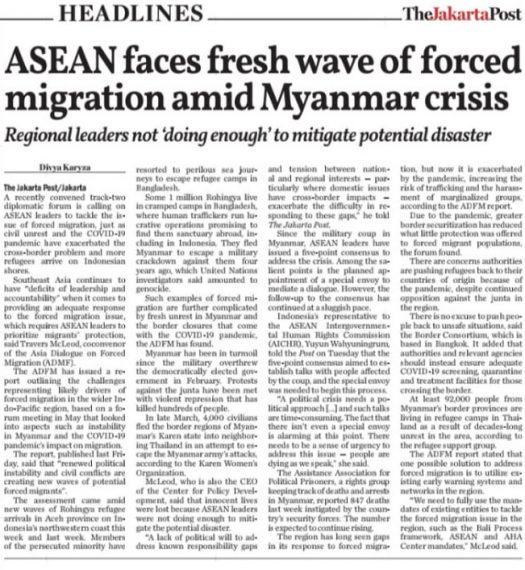Published in The Jakarta Post on 11 June 2021.
A recently convened track-two diplomatic forum is calling on ASEAN leaders to tackle the issue of forced migration, just as civil unrest and the COVID-19 pandemic have exacerbated the cross-border problem and more refugees are ending up on Indonesian shores.
Southeast Asia continues to have “deficits of leadership and accountability” when it comes to providing an adequate response to the forced migration issue, which requires ASEAN leaders to prioritize migrants’ protection, said Travers McLeod, coconvenor of the Asia Dialogue on Forced Migration (ADMF).
The ADFM has issued a report outlining the challenges representing likely drivers of forced migration in the wider Indo-Pacific region, based on a forum meeting in May that looked into aspects such as instability in Myanmar and the COVID-19 pandemic’s impact on migration.
The report, published last Friday, said that “renewed political instability and civil conflicts are creating new waves of potential forced migrants”.
The assessment came amid new waves of Rohingya refugee arrivals in Aceh province on Indonesia’s northwestern coast this week and last week. Members of the persecuted minority have resorted to perilous sea journeys to escape refugee camps in Bangladesh.
Some 1 million Rohingya live in cramped camps in Bangladesh, where human traffickers run lucrative operations promising to find them sanctuary abroad, including in Indonesia. They fled Myanmar to escape a military crackdown against them four years ago, which United Nations investigators said amounted to genocide.
Such examples of forced migration are further complicated by fresh unrest in Myanmar and the border closures that come with the COVID-19 pandemic, the ADFM has found.
Myanmar has been in turmoil since the military overthrew the democratically elected government in February. Protests against the junta have been met with violent repression that has killed hundreds of people.
In late March, 4,000 civilians fled the border regions of Myanmar’s Karen state into neighboring Thailand in an attempt to escape the Myanmar army’s attacks, according to the Karen Women’s Organization.
McLeod, who is also the CEO of the Center for Policy Development, said that innocent lives were lost because ASEAN leaders were not doing enough to mitigate the potential disaster.
“A lack of political will to address known responsibility gaps and tension between national and regional interests – particularly where domestic issues have cross-border impacts – exacerbate the difficulty in responding to these gaps,” he told The Jakarta Post.
Since the military coup in Myanmar, ASEAN leaders have issued a five-point consensus to address the crisis. Among the salient points is the planned appointment of a special envoy to mediate a dialogue. However, the follow-up to the consensus has continued at a sluggish pace.
Indonesia’s representative to the ASEAN Intergovernmental Human Rights Commission (AICHR), Yuyun Wahyuningrum, told the Post on Tuesday that the five-point consensus aimed to establish talks with people affected by the coup, and the special envoy was needed to begin this process.
“A political crisis needs a political approach […] and such talks are time-consuming. The fact that there isn’t even a special envoy is alarming at this point. There needs to be a sense of urgency to address this issue – people are dying as we speak,” she said.
The Assistance Association for Political Prisoners, a rights group keeping track of deaths and arrests in Myanmar, reported 847 deaths last week instigated by the country’s security forces. The number is expected to continue rising.
The region has long seen gaps in its response to forced migration, but now it is exacerbated by the pandemic, increasing the risk of trafficking and the harassment of marginalized groups, according to the ADFM report.
Due to the pandemic, greater border securitization has reduced what little protection was offered to forced migrant populations, the forum found.
There are concerns authorities are pushing refugees back to their countries of origin because of the pandemic, despite continued opposition against the junta in the region.
There is no excuse to push people back to unsafe situations, said the Border Consortium, which is based in Bangkok. It added that authorities and relevant agencies should instead ensure adequate COVID-19 screening, quarantine and treatment facilities for those crossing the border.
At least 92,000 people from Myanmar’s border provinces are living in refugee camps in Thailand as a result of decades-long unrest in the area, according to the refugee support group.
The ADFM report stated that one possible solution to address forced migration is to utilize existing early warning systems and networks in the region.
“We need to fully use the mandates of existing entities to tackle the forced migration issue in the region, such as the Bali Process framework, ASEAN and AHA Center mandates,” McLeod said.




